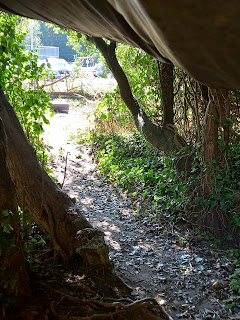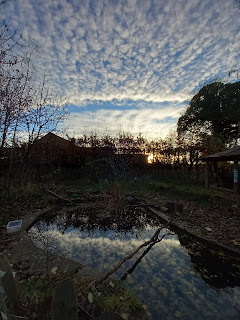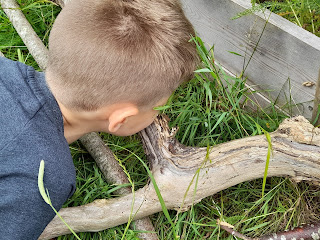Is Outdoor Learning Forest School?
Here we are. September. The new school year no longer feels new, Mama beech has met all the classes from last year, a little taller, a little more mature (both the tree and the children). The meadows are channelling 'The Triffid' vibes, the brambles are out to trip as many people as they can, and the stinging nettles menacingly look DOWN on us all...
So everything is currently perfectly normal for the start of term! Many Forest Schools have been open all summer, but for us, there was a six-week break. I'd like to say it was a calm and recuperating time, but personally, I moved home, so it was ridiculously busy and has yet to ease! But that is a novel in itself.
Of course, many Forest Schools have been open all summer, for them, I hope the lifting of restrictions in July allowed a busy season of sessions. Some schools have started venturing into Forest School for the first time, others are embracing Outdoor Learning and altering their planning to make more possible. With recovery from the stress of two disrupted school years high on the Government agenda, the need to 'catch up' on 'lost learning' is in every school's mind and is balanced against wellbeing and mental health.
Our school is continuing to increase the Outdoor Learning available and is developing opportunities to make this easier and more routine. This runs alongside Forest School because there is a defined difference between the two.
Outdoor Learning can be led by the class teacher, or a TA, and has a Learning Intention{ a specific outcome to work towards linked to the curriculum. Whatever the task or experience is, it will be defined and pretty much mandatory!
It is a great way to make a lesson memorable, a perfect experience to incite participation, and an environment that offers so many more ways to deliver a lesson. Forest School will support, and advise any and all staff that want to liaise. Forest School will not be offering 'lessons'.
I know everybody works differently. I know everybody has to please different people, whether parents, clients, headteachers, or landowners, and that may influence what is offered in a session. Plenty of Forest Schools have a focus for their session, or plan around a class topic, or have a different craft activity available each time.
But it isn't something I do.
That isn't to say that children who want to do something (like in the photo, where year 4 wanted to make Stone Age Axes) are not supported. These children spent almost an entire session engrossed in the self-chosen activity, and were free to move away and do other things, which many did, and to return whenever they wanted.
In the last 40 years the quantity and variety of training available for those wanting to train as a Forest School Leader has expanded. Once trained, how sessions fit into the school, the curriculum, or the community, will need to be addressed, and influence the provision offered by trained staff. It has led to a diversity of experiences on offer. It has also distanced England from the original pedagogy of Forest School developed in Scandanavia.
I'm not going to condemn this as a bad thing, nor am I going to celebrate it. The range of practice out there is definitely a good thing for the private sector, affording parents the opportunity to shop around for groups offering extra-curricula clubs, out of school services, childcare, education... It also allows for different business models to exist and hopefully thrive.
However, it has meant that offering 'Forest School' is not an easily defined, obviously understood service.

We at Chartham will continue to focus on developing the child. This week that involved building muscles and confidence (self-propelled swinging), a skill many children seem to lack! The frequent demands of 'a push' rarely help as children sit, slack legs dangling, not participating in their own fun! Swinging seems to be something that happens TO them.
Children were allowed time alone, time to talk, time to explore, time to lead and time to follow. Independent learning abounded, children were allowed to grab an idea and follow it wherever it took them encouraged to believe in their ability to challenge themselves, to investigate, and to learn.
We all bring our own skills, our own strengths, and our own passions to our practice. Some of us also have experienced pressure to do things differently. People have told me they are frustrated that what is expected grows further removed from Forest School and they struggle to find ways to make demands fit the ethos.

I wish I had some magic spell that would permanently separate Outdoor Learning from Forest School Pedagogy. Both are equally important. Both deliver amazing support to children's learning. But although they may overlap a little, they are not interchangeable.
I have agreed to do one-off sessions of outdoor learning with specific activities and learning intentions, but they are few and far between. The above illustration explains the general outcomes I aim for, with each and every child focusing on any number of these, in assorted orders, in different ways, during each session.
It isn't easy or simple. It can be frustrating, sometimes children repeat the same behaviour, the same choices, over and over, and while I can see that this fulfils a need in them, the lack of interest in expanding those choices is something I would love to know how to instill!
Also, like this week, when children ask if it's OK to help the premises team (who are cutting grass), by raking, I always say yes, which meant this week a Year 6 child, a Year 2 child, and two Year 4 children spent almost their entire sessions engaged in nothing else. Literally adjacent to, but not in Forest School! But how could I refuse them an opportunity that they wanted to participate in? One which meant teamwork, good listening, cooperation, coordination, physical exercise, concentration, a sense of achievement, self-motivation, and some kind of empathy and willingness to be helpful!?!?
I don't know how I could 'allow' repetitive behaviour, or 'permit' children to volunteer to help the caretaker, if I had a learning intention to meet by the end of session.
So I will still choose to follow the Forest School ethos as closely as I can while helping Outdoor Learning throughout the school. I'm not judging Leaders who choose to do things differently or those who find that they have to. This is an option my set of circumstances and skills affords me and I embrace it.
A school cannot be committed to Outdoor Learning if the FSL is the sole outdoor practioner!
Schools cannot expect class teachers to become great outdoor teachers without them actually going outside and doing it.
Hands-on learning works both ways.
And frees up Forest School to develop its pedagogy to support essential learning skills.










Comments
Post a Comment